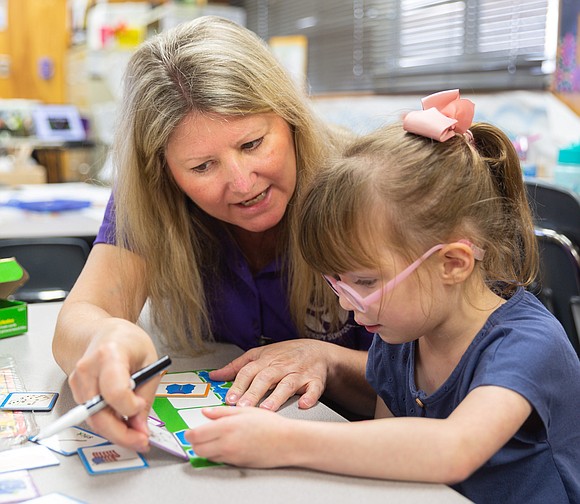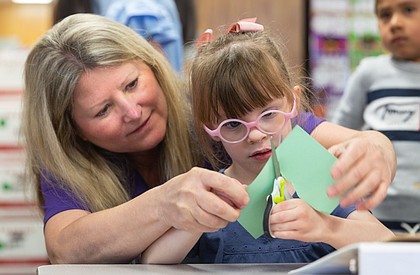Occupational Therapy Month: Celebrating Colleagues Who Provide Support in Unique Ways
Style Magazine Newswire | 4/14/2023, 4:45 p.m.

In observance of Occupational Therapy Month and Autism Awareness Month, we shine a light on Harris County Department of Education Occupational Therapist (OT) Tammy Hillegeist, who works with students in Cypress-Fairbanks ISD like five-year-old Roslyn Black, who is on the autism spectrum.
“I get called in for things like fine motor skills, usually handwriting, sensory difficulties or self-regulation,” Hillegeist said. “But we do so many other things, too. Sometimes you’re looking at how well they coordinate both hands to work cooperatively to do a task. So, it’s not just fine motor skills, but it might be bimanual activities or bilateral coordination skills to do something like tying shoelaces.”
In contrast to clinical OT, which starts with a diagnosis and referral from a doctor and addresses all the environments in which a child may struggle with tasks, school-based OT intervention usually starts with a teacher, parent, or another involved person who identifies a student who is struggling with school-related tasks and requests an OT evaluation. School-based OT interventions are done to assist in areas that may be impacting the student academically, such as holding a pencil, writing effectively, paying attention, following directions, or organizing materials.
Hillegeist, one of 94 OTs employed by HCDE, is a veteran in her field with 26 years of experience, 17 of which have been in school-based practice with the Department. She currently oversees the OT needs of students in three Cy-Fair ISD schools.
For Hillegeist, time spent with Roslyn, a pre-kindergarten student at Cy-Fair’s Black Elementary School, involves strategies that focus on handwriting and developmental delays that limit her participation in school settings. Hillegeist first started working with Roslyn two years ago.
“She’s very small for her age, as are her tiny little fingers, so it was hard for them to hold a crayon. So, she wasn’t using her fingers much,” said Hillegeist. “If I gave her a larger, ball-shaped crayon she would use the whole hand to try to grasp it, like a fist. We worked on just trying to scribble on a paper, even for just a few seconds.”
Next, Hillegeist advanced to implementing the use of adaptive pencil grips.
“Then, we worked on trying to write a line. You can see the progress going from a fist to grasp, or not even touching the writing tool, to at least sitting there and doing multiple things for writing,” she said. “Now, we’re trying to make intentional marks and working on most of the letters of her name, which she can successfully write.”
Hillegeist also works with Roslyn on focus and attention using redirection strategies and positive reinforcement. For continuity in her education plan, Hillegeist also educates Roslyn’s classroom teachers and family members on these approaches.
“It’s important that I work with whoever is teaching Roslyn, whether it be the general ed teacher, special ed teacher, or paraprofessional, and educate them on whatever equipment I’ve brought into the classroom, like a slant board or pencil grips. I explain why they are important and how to use them,” said Hillegeist. “If Roslyn doesn’t want to use them, I will share some things I know she will work for in order to get her to use the equipment, like Goldfish Crackers or time at the smart board.”
Another strategy that Hillegeist implements is to break crayons to make them shorter, which forces Roslyn to use the tips of her fingers. This builds strength and stamina and helps with dexterity to form letters, write her name, or color within the lines.
“What Tammy really does is provide guidance to the teachers and says, ‘This is what I’m seeing that will work best with this child. If you use this in the classroom, I think that’s going to help.’ And then the teachers try to make sure that Roslyn is using that pencil grip,” said Kathryn Grimberg, Roslyn’s grandmother. “Her handwriting is improving, and a lot of that has to do with the guidance that Tammy gives them.”
As Hillegeist explains, “Maybe a teacher is new, or they haven’t worked with a child that has special needs, so you have to educate them because they’re the ones who are in the classroom with the student every day, and working on an OT skill every day is how a student will make progress. Our Cy-Fair teachers are wonderful and are always willing to go the extra mile to do whatever is needed to help our students make progress.”
The value of services HCDE occupational therapists provide to districts like Cy-Fair ISD is not only in supporting the schools they are assigned to but in the consistency and quality of the therapy.
“Teachers go to school and learn how to be teachers. OTs go to school and they learn how to be therapists working in hospitals and clinics. There is a smaller percentage of occupational therapists who work in school-based practice. So that’s what we do. We mentor them, and then we go into the classrooms with them to teach them how to do school-based practice. And that’s why districts rely on us,” said Senior Director for HCDE School-Based Therapy Services Carie Crabb. “Most district administrators are educators. They don’t know how to teach someone to do school-based OT. We also provide ongoing continuing education and help to make sure that they’re in compliance with their licensure rules.”
Hillegeist says the support she receives from HCDE’s School-Based Therapy Services Division is why she has stayed for nearly two decades.
“HCDE has been so supportive with providing the necessary continuing education. They make sure that I don’t have a conflict with my license and they bring guest speakers to educate us who are therapists themselves. They always support you when you need help with a difficult case. They always have your back.”
To learn more about HCDE School-Based Therapy Services, visit hcde-texas.org/therapy-services.











